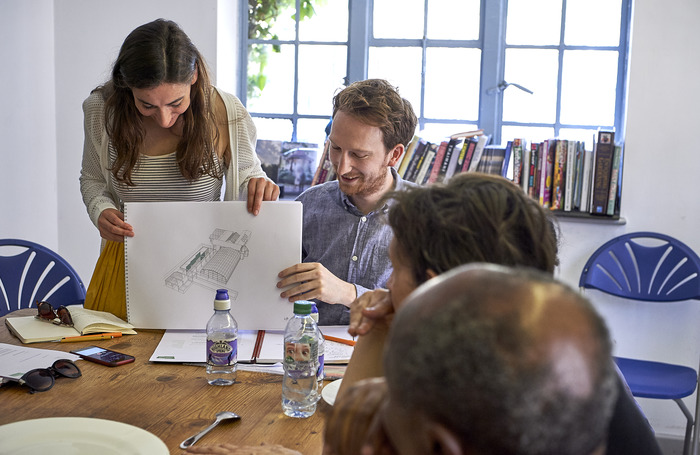Corporate Social Responsibility (CSR) activities are not unusual in architects’ practices, but RIBA Chartered Practice Formation Architects has found that it can energise the whole ethos of the workplace when that practice happens to be an employee-owned trust (EOT).
Giving staff members responsibility for CSR activities and allowing them to pursue their own passions and interests has led not just to pro bono community work and charitable fund raising but has brought forward practice champions for more sustainable ways of working, mental health awareness and general staff wellbeing.

The CSR programme has proven to have great synergy with the EOT structure by emerging as an effective mechanism for giving employee owners a real voice in the way the office is run.
Formation Architects was one of the early converts to an EOT as a means of managing practice succession, setting up its trust in December 2015. Director Neil Farrance recalls that it was clear from the outset that senior management had to find meaningful ways of engaging with co-owning staff.
‘Typically, the management of an employee-owned business includes a trust board which includes staff representatives, however such a structure does not automatically give the representatives meaningful influence on management decisions,’ says Farrance. ‘At Formation Architects, we established a management forum – DADA, standing for: directors, associate directors and associates – which has various working groups, including CSR, to which anyone can bring their ideas and contribute.’
Around this time, the practice signed up to Heart of the City, a non-profit membership group that helps businesses in London find opportunities for responsible community engagement.
‘It was quite inspirational for us, but it was also clear that it would need wide support in the office to make it work,’ explains Farrance.
A presentation to staff to gauge interest generated overwhelming support for the idea and the CSR working group started to expand until it comprised 15 or more staff members, around 20% of practice staff.
The CSR working group later expanded with three sub-groups to make things more workable and decision-making more effective: charity fundraising and payroll giving, sustainable business practices, and community outreach.
Fund-raising social activities have been bolstered by payroll donations that now involves 50% of staff, netting the practice a Diamond Award from the Charities Trust for the level of staff commitment.
The sustainability group has introduced better practices for waste management and energy use that have chimed with the concerns of many of the practice’s employee-owners.
Architect Edwin Dudding says directors took a step back as things evolved and allowed the CSR groups to become pretty autonomous.
‘The forum allows a wide range of interests to be pursued,’ says Edwin, ‘with an ethos that allows members of staff to influence the wellbeing of the office and make it as inclusive as possible.
‘There is a time commitment, but activities such as fund raising bring everyone together and it has a major knock-on effect on the life of the office.’
When the practice held its first mental health awareness event for staff, it was initiated not by HR, but via the forum, and run by architect Baldeep Heer, who had a personal interest in raising mental health awareness within the practice.
On the community outreach front, the practice decided to pursue greening-up projects in its own neighbourhood in Lambeth, and there is now a well-advanced project to provide a space for the local Myatt’s Fields Park community group and its volunteer gardeners.
This exercise has been treated as a mini-project: defining a brief, a programme and a budget. Workshops were held internally and with the volunteer gardeners and the CSR group is now working with the community group to secure finance to get its project built.
As other practices know well, allowing junior staff to take responsibility for pro bono projects can pay dividends in terms of personal professional development and acquiring new skills sets.
Chloe Hand, who is working towards her Part III, found the work with Myatt’s Fields Park volunteers, in parallel with the high-end projects she is normally involved with, created an opportunity to diversify and expand her experience. Finding herself engaging with clients and being personally answerable is proving challenging and valuable in equal measure.
‘These were aspects of practice I wouldn’t normally get the chance to do, different stages of project work and even helping to raise finance, all things I would not expect to do until much later in my career,’ says Hand. ‘It was clear that the CSR team had an appetite to develop new skills and enjoy the opportunity to share them.’
Farrance has seen a wider business benefit as well: staff morale, a more inclusive culture, communication skills, building confidence, as well as recruitment. To enable the team to fit in their CSR activity, they have developed new skills to manage their time more effectively and boost productivity as a result. That has to be a win-win situation for any practice.
Thanks to Neil Farrance (Director), Edwin Dudding (Architect) and Chloe Hand (Architectural Assistant) at Formation Architects.
Text by Neal Morris. This is a Professional Feature edited by the RIBA Practice team. Send us your feedback and ideas
RIBA Core Curriculum Topic: Architecture for social purpose.
As part of the flexible RIBA CPD programme, Professional Features count as microlearning. See further information on the updated RIBA CPD Core Curriculum and on fulfilling your CPD requirements as an RIBA Chartered Member.
Posted on 16 August 2018.









